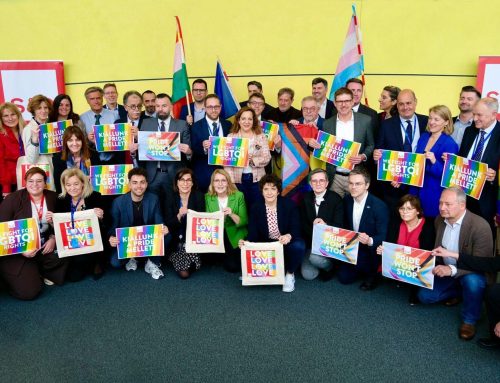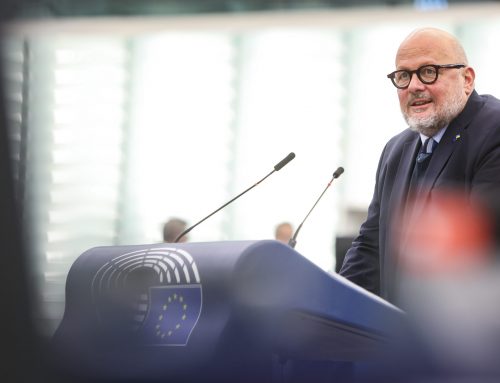
4 May
- Coronavirus Global Response: EU launches pledging effort
The EU is joining forces with global partners to kick-start a pledging effort – the Coronavirus Global Response. The aim is to gather significant funding to ensure the collaborative development and universal deployment of diagnostics, treatments and vaccines against coronavirus. On the first day of the pledging marathon, 7.4 billion euros were raised to kick-start the global cooperation.
30 April
- 127 state aid measures approved by the European Commission
In April the Commission approved 127 state aid measures to support businesses and protect livelihoods across Europe during the coronavirus outbreak
29 April
- The EU reinforced its support for the Western Balkans to address the COVID-19 crisis
The European Commission announced over 3.3 billion euro of EU financial support mobilised jointly with the European Investment Bank to the benefit of the Western Balkans’ citizens.
28 April
- The European Commission adopted a banking package
The banking package has the aim to help facilitate bank lending to households and businesses throughout the EU. The international pledging marathon started on 4 May and will run until the end of May.
24 April
- EU Civil Protection Mechanism
As of 24 April, more than 52.000 EU citizens have been brought to Europe from all over the world through the EU Civil Protection Mechanism.
- The Commission introduced temporary measures adjusting the Personal Protective Export authorisation scheme for 30 days to suit current needs
(The EU initially introduced the export authorisation scheme for PPE on 15 March to ensure adequacy of supply of such products in the EU in the times of coronavirus crisis.)
23 April
- The Heads of States endorsed the agreement found by the Eurogroup on three important safety nets for workers, business and sovereigns amounting to a package worth 540 billion euros after a videoconference of the European Council.
The package should be ready by 1 June 2020 and Heads of States tasked the European Commission to come up with a proposal for a recovery fund.
22 April
- The European Commission proposes €3 billion macro-financial assistance package to support ten neighbouring countries
The Commission has adopted a proposal for a €3 billion macro-financial assistance (MFA) package to ten enlargement and neighbourhood partners to help them limit the economic fallout of the coronavirus pandemic. The proposal comes on top of the ‘Team Europe’ strategy.
- Collateral easing measures by the European Central Bank (ECB)
The ECB announced additional collateral easing measures related to eligibility (rating). On 7 April, the ECB had already announced a package of temporary collateral easing measures.
14 April
- The EU’s Emergency Support Instrument is activated
The 2.7 billion € instrument was activated to directly support the healthcare systems of the EU countries in their fight against the corona pandemic.
9 April
The Eurogroup decided on several additional crisis response instruments amounting to 540 billion euros – which are listed below:
- The Eurogroup tasked the European Stability Mechanism (ESM) to establish a Pandemic Crisis Support based on the existing ECCL precautionary credit line
The credits would be available to all euro area Member States with the requirement that they cover, directly or indirectly, health-related expenses in response to the coronavirus. Access granted will be up to 2% of the respective member states’ gross domestic product as of end-2019, as a benchmark. Should all 19 euro area countries draw from the credit line, this would amount to a combined volume of around €240 billion.
- The European Investment Bank (EIB) created a pan-European guarantee fund of 25 billion €
The fund will enable the EIB Group to scale up its support for European companies up to an additional €200 billion – with a focus on SMEs. The guarantee fund envisages a contribution from all 27 EU Member States and will also be open to contributions by third parties, for example from the EU budget. The guarantee fund will be established under the EIB’s structure of Partnership Platform for Funds (PPF)
- A European instrument for temporary Support to mitigate Unemployment Risks in an Emergency (SURE) is proposed by the EC
On 2 April, the European Commission proposed a new instrument for temporary Support to mitigate Unemployment Risks in an Emergency (SURE). It will allow for a financial assistance up to EUR 100 billion in the form of loans from the EU to affected Member States. The Eurogroup backed the proposal on 9 April.
8 April
- EU global response to fight the pandemic
The European Commission and the High Representative set out plans for a robust and targeted EU response to support partner countries’ efforts in tackling the coronavirus pandemic.The EU will secure financial support to partner countries amounting to more than €15.6 billion from existing external action resources. The EU’s response follows a ‘Team Europe‘ approach, aimed at saving lives by providing quick and targeted support to our partners, to face this pandemic. It combines resources from the EU, its Member States and the financial institutions, in particular the European Investment Bank and the European Bank for Reconstruction and Development.
- The Commission was launching ESCALAR, a new investment approach, developed together with the European Investment Fund (EIF).
ESCALAR will support venture capital and growth financing for promising companies, enabling them to scale up in Europe and help reinforce Europe’s economic and technological sovereignty. It will provide up to €300 million aiming to increase the investment capacity of venture capital and private equity funds, triggering investments of up to €1.2 billion, or four times the original investment, to support promising companies.
3 April
- Tax measures to provide medical equipment
The European Commission decided to waive value-added tax (VAT) and import duties (from 30 January 2020 to 31 July 2020) to combat the effects of the COVID-19 outbreak. The goal is to reduce the financial burden of acquiring medical equipment from third countries.
1 April
- Coronavirus Response Investment Initiative
The European Commission proposal to make best of use existing EU budget resources entered into force after the approval by the European Parliament and the Council. This will allow the use of EUR 37 billion under cohesion policy to address the consequences of the COVID-19 crisis. In addition, the scope of the Solidarity Fund was broadened to include major public health crises. Starting from the 1st of April, this allows the hardest hit Member States to get access to financial support of up to EUR 800 million in 2020.
- Commission guidance on Conformity assessment procedures for 3D printing and 3D printed products to be used in a medical context for COVID-19
To help industry and small and medium enterprises (SMEs) explore the industrial capacities offered by additive manufacturing processes, the Commission summarised frequently asked questions on 3D printing.
- Commission Guidance from the European Commission on using the public procurement framework in the emergency situation related to the COVID-19 crisis 2020/C 108 I/01
This guidance is to help hospitals and healthcare professionals urgently need medical supplies and personal protective equipment purchased by public authorities.
31 March
- Stepping up research and funding to address the coronavirus
As of 31 March, the European Commission supports 18 projects in the fight against COVID-19. They involve 140 research teams from across the EU and beyond, and are funded with a total budget of EUR 48,5 million from Horizon 2020.
- Strengthening resilience in countries hosting refugees
The EU strengthened its support for refugees from Syria and vulnerable persons in Iraq, Jordan and Lebanon through a new package of almost 240 million €.
30 March
- Commission Guidance on Conformity assessment procedures for protective equipment
The guidance for manufacturers is to help economic operators to assess whether they can convert their existing facilities to produce protective equipment.
- Commission Guidance on the applicable legislation for leave-on hand cleaners and hand disinfectants (gel, solution, etc.)
The Coronavirus crisis guidance informs economic operators, including small and medium-sized enterprises, on the applicable legal framework for the placing hydro-alcoholic gel (i.e. the Cosmetic Products Regulation or the Biocidal Products Regulation) on the EU market and the claims which can be made to the user.
- EU solidarity with Western Balkans and Eastern Neighbourhood
The Commission has reallocated 140 million euros for the most immediate needs in the Eastern Neighbourhood countries, and will redirect the use of existing instruments worth up to EUR 700 million to help mitigate the socio-economic impact of the coronavirus crisis. Similarly, it announced up to 38 million euros in immediate support for the Western Balkans to tackle the health emergency, and reallocation of EUR 374 million to help the socio-economic recovery.
27 March
- A European Innovation Council Accelerator call of €164 million has attracted a significant number of start-ups and businesses with innovations that could also help tackle the pandemic.
- The European Central Bank (ECB) asks banks not to pay dividends until atleast October 2020
The ECB asked banks not to pay dividends for the financial years 2019 and 2020 until at least 1 October 2020 to boost banks’ capacity to absorb losses and support lending to households, small businesses and corporates during the coronavirus (COVID-19) pandemic. Banks should also refrain from share buy-backs aimed at remunerating shareholders.
23 March
- General Escape Clause for the Stability and Growth Pact activated
EU ministers of finance agreed on the general escape clause for the Stability and Growth Pact, which enables member states to disregard the imposed spending limits. Due to the clause, budget deficits can be higher than 3% of a country’s GDP and Debt can be higher than 60% of a country’s GDP.
20 March
- The European Central Bank Banking Supervision provides further flexibility to banks in reaction to coronavirus
The European Central Bank (ECB) announced further measures to ensure that its directly supervised banks can continue to fulfil their role to fund households and corporations amid the coronavirus-related economic shock to the global economy.
- Commission Guidance note to Member States related to Commission Implementing Regulation (EU) 2020/402 making the exportation of certain products subject to the production of an export authorisation, as last amended by Commission Implementing Regulation (EU) 2020/426
19 March
- Temporary framework to further support the economy
The European Commission has adopted a Temporary Framework to enable Member States to use the full flexibility foreseen under State aid rules to support the economy in the context of the COVID-19 outbreak.
- The European Commission creates first ever rescEU stockpile of Medical Equipment
The creation of a strategic rescEU stockpile of medical equipment such as ventilators and protective masks has the objective to help the EU in the context of the COVID-19 pandemic.
- Commission Information Document on the Package Travel Directive with the Covid-19
About clarifying cancellation policies and further rules and rights, such as rights of passengers who are blocked abroad.
18 March
- 750 billion euros Pandemic Emergency Purchase Programme (PEPP)set up by the European Central Bank (ECB)
New additional measures of the ECB included an additional €750 billion asset purchase program of private and public sector securities (Pandemic Emergency Purchase Program, PEPP) until end-2020, an expanded range of eligible assets under the corporate sector purchase program (CSPP), and relaxation of collateral standards for Eurosystem refinancing operations (MROs, LTROs, TLTROs). The collateral standards were further eased in early April.
- Interpretative Guidelines on EU passenger rights regulations in the context of the developing situation with Covid-19
The European Commission’s guidelines’ aim is clarifying how certain provisions of the EU passenger rights legislation apply in the context of the Covid-19 outbreak, notably with respect to cancellations and delays.
17 March
- A European Team of COVID-19 experts
The European Commission launched an advisory panel on COVID-19, consisting of epidemiologists and virologists from different Member States, to strengthen EU coordination and its medical response.
16 March
- EU funding offered to innovative vaccines company CureVac
The Commission offered up to EUR 80 million of financial support to CureVac, a vaccine developer from Tübingen, Germany, to scale up development and production of a vaccine against the coronavirus in Europe.
- Mobilisation of 40 billion euros to fight the COVID-19 pandemic by the European Investment Bank (EIB)
The 40 billion euros will be used to bridge loans, credit holidays and other measures to alleviate liquidity and working capital constraints for SMEs and mid-caps.
- Guidelines for border management measures to protect health and ensure the availability of goods and essential services
The Commission has also taken steps to protect the availability of personal protective equipment by requiring that their export outside of the EU is subject to an export authorisation by EU countries.
13 March
- The European Commission has unlocked €1 billion from the European Fund for Strategic Investments (EFSI) that serves as a guarantee to the European Investment Fund (EIF), part of the European Investment Bank Group.
This allows the EIF to issue special guarantees to incentivise banks and other lenders to provide liquidity to at least 100,000 European SMEs and small mid-cap companies hit by the economic impact of the coronavirus pandemic, for an estimated available financing of €8 billion.
- Commission Recommendation (EU) 2020/403 of 13 March 2020 on conformity assessment and market surveillance procedures within the context of the COVID-19 threat
The Recommendation has been issued to speed up the uptake of new products not based on harmonised standards, without compromising on our health and safety standards and without undue delays.
12 March
- Monetary policy support by the ECB
The ECB decided to provide monetary policy support through (i) additional asset purchases of €120 billion until end-2020 under the existing program (APP), and (ii) providing temporarily additional auctions of the full-allotment, fixed rate temporary liquidity facility at the deposit facility rate and more favorable terms on existing targeted longer-term refinancing operations (TLTRO-III) between June 2020 and June 2021




